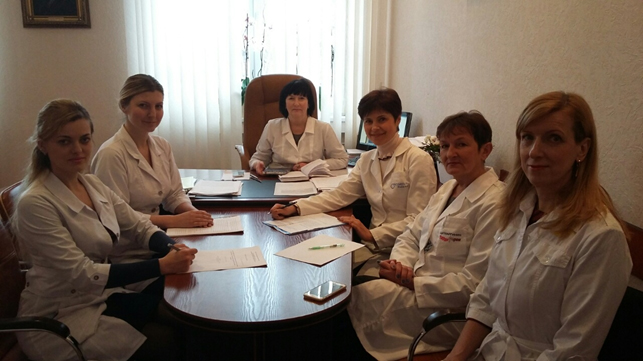Department’s tasks and functions:
 Head of the Department - Doctor of Medical Sciences, Professor Fadieienko Galyna Dmytrivna
Head of the Department - Doctor of Medical Sciences, Professor Fadieienko Galyna Dmytrivna
- in-depth study of pathogenetic mechanisms of the most important diseases of the liver and the gastrointestinal tract: non-alcoholic fatty and alcoholic liver diseases, gastroesophageal reflux disease;
- study of intestinal microbioma and its influence on pathogenesis, early diagnosis, treatment and prophylaxis of digestive organs
- assessment of the basic patterns of development and progression of non-alcoholic fatty and alcoholic liver diseases in patients with various diseases of the internal organs, in particular metabolic syndrome;
- development of original approaches to the diagnostics of the course and prognosis of gastric ulcers and duodenal ulcer. Identification of criteria for prediction of complications of peptic ulcer, such as gastrointestinal bleeding, perforation, penetration;
- development of highly informative methods of early diagnostics and prediction of non-alcoholic fatty liver disease in patients with metabolic syndrome; definition of pathogenetic links in the formation of cardiovascular risk in these patients;
- development of pathogenetically-based methods of treatment of non-alcoholic fatty liver disease, gastroesophageal reflux disease (in particular its extra-esophageal manifestations) and inflammatory bowel diseases (non-specific ulcerative colitis and Crohn's disease);
- development of effective approaches to primary and secondary prevention of diseases of the digestive system in order to prevent or inhibit the development of complications of these diseases.
Main scientific directions:
Study of the prevalence, determination of etiological factors, mechanisms of development and chronicization of liver diseases; development of new methods of diagnostics and prediction of variants of their course considering the gene polymorphism and determination of personified therapy; approbation and application of new methods for treatment and prevention of complications of liver diseases based on pharmacologic medications and lifestyle changes. An important area is the study of comorbid pathology - liver and cardiovascular diseases, liver and diabetes, obesity, and the like.
Another important area in the department's activity is the study of the features of the course of esophageal diseases, including gastroesophageal reflux disease (GERD), chronic gastritis, associated with Helicobacter pylori, pathologies of pancreas, small and large intestine.
 Staff members of the department
Staff members of the department
Most important research results:
- A comparative analysis of the genetic profile of patients with GERD in combination with coronary heart disease and isolated GERD has been performed and the relationship between GNB3 gene polymorphism and degree of lesion of the esophagus mucosa is determined.
- The predictors of the risk of developing erosive forms of GERD with its comorbid course with the coronary heart disease considering the markers of endothelial dysfunction are determined.
- The reaction of the epithelium of the esophagus, the activity of the inflammatory process and the level of inflammatory infiltration of the esophagus mucus in patients with comorbid pathology have been characterized.
- Based on disbalance of regenerative and destructive processes in the esophageal mucosa, the schemes of treatment of patients with GERD in combination with coronary heart disease considering of endothelial dysfunction and inflammatory-destructive changes in the mucous membrane of the esophagus have been developed.
- The correlations between NAFLD and obesity (67%), glucose tolerance and type 2 diabetes mellitus (57%), hypertriglyceridemia (47%) and low levels of high density lipoprotein were determined; arterial hypertension was detected in 17% of NAFLD patients.
- We investigated the main phenotypic features of the NAFLD and the genetic polymorphism of the ADIPOR2 gene in NAFLD patients, which allowed to individualize the metabolic status of these patients and create an algorithm for early diagnostics and prediction of the formation of atherogenesis in patients with different levels of cardiovascular ischemia.
- An algorithm for appropriate prevention of cardiovascular diseases in NAFLD patients.
All methods of diagnostics, prevention and treatment of liver and esophagus, pancreas, small and large intestines are carried out using modern technologies, including genetic, cytological, immunohistochemical and other methods of investigation.
Over the years, the department has published more than 20 monographs, 1250 articles. 5 theses for obtaining a scientific degree of the doctor of medical sciences and 19 - candidate of medical sciences are protected.
The clinical base of the department is the Department of Gastroenterology and Therapy of the Institute for 60 beds. Head of the department is Chernyak A.M, MD, PhD.
Staff members of the department:
Fadieienko Galina Dmitrievna
Kushnir Inna
Gridnyev Oleksiy Evgenievich
Chernova Valentina Mikhailovna
Solomentseva Tatiana Anatolyevna
Nikiforova Yana
Kurinna Olena Grigorivna
Chereliyk Natalya Igorevna






 Head of the Department - Doctor of Medical Sciences, Professor Fadieienko Galyna Dmytrivna
Head of the Department - Doctor of Medical Sciences, Professor Fadieienko Galyna Dmytrivna Staff members of the department
Staff members of the department